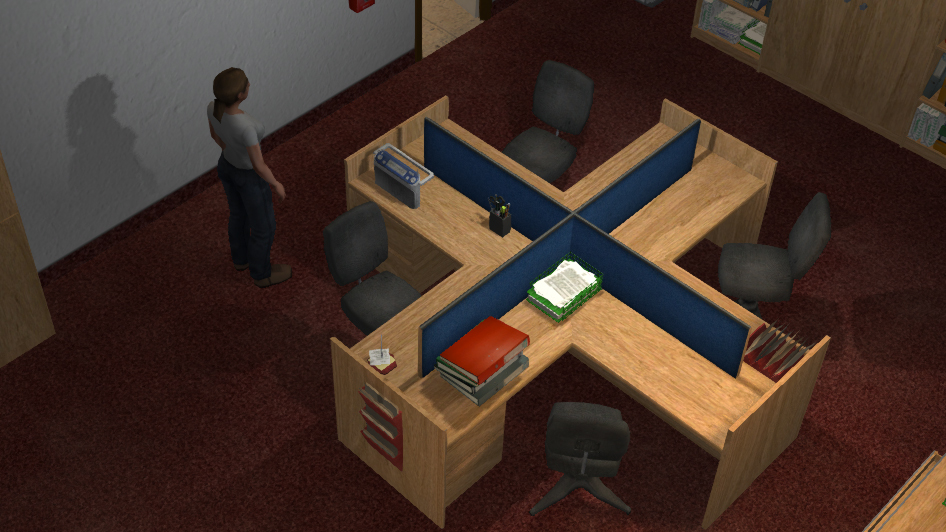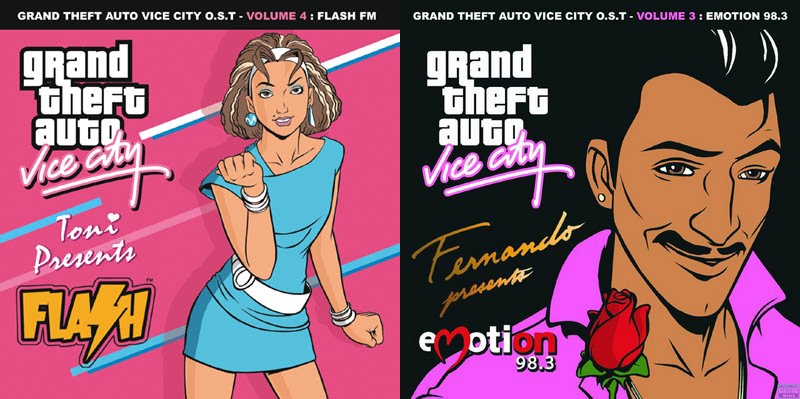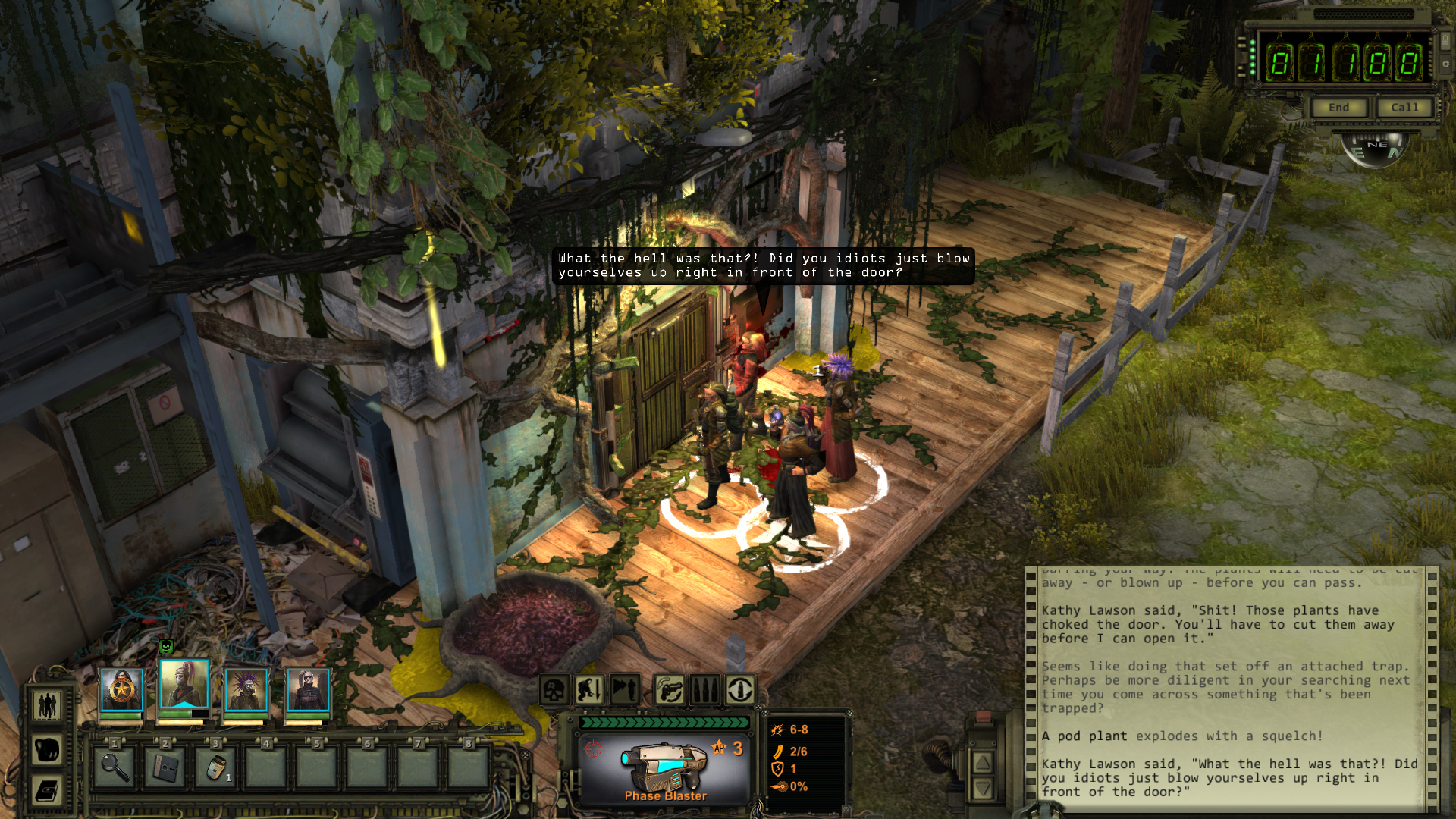A Voice On The Radio

Every week, Richard Cobbett takes a look at the world of story and writing in games.
Radio is easily one of gaming's least seized storytelling devices, and that's a real pity. I was thinking of this while playing Dead State the other week, a game that for its many flaws does a great job when it comes to character writing, and one character in particular - the last DJ whose broadcasts you can tap into on a daily basis. I really liked him, and the functions he serves - to offer subtle hints about what to do next and where to go, to provide a connection to characters outside the player's sphere of awareness, and to add a touch more humanity to a world that can so easily dissolve into just mechanics and challenges.

What's really great about him as opposed to most in-game hosts is that by and large they tend to be one note so that you can dip in and out of their content more easily. GTA's hosts for instance each tend to be one key personality trait, as do the likes of Three Dog in Fallout. The DJ in Dead State though is the hero of his own little story, much like Cecil over in the wonderful Welcome To Night Vale podcast. Each day you can check in for a little snippet of story, which seems him bouncing from cheery nihilism to serious depression at being locked in a booth with dwindling supplies, to slivers of hope, like his genuine happiness at getting a call from someone just wanting to know if he's okay and the effect that it subsequently has on his mood.
"Here's the thing. So, I don't know what's wrong with us as a species, but from what I'm hearing most of you suck and... no, that's not the right word. What I want to say is, most of you are complete assholes. No, still not right. Oh, I have it. Irredeemable cockwipes, but like, in a way that doesn't sound flattering. We've got the dead coming back to life, eating the living, and you fuckers are killing each other over cappuccino makers? I mean... how did it come to this? Aren't we supposed to unite against a common enemy. Aren't we supposed to be made stronger? Apparently not... you DESPICABLE GAPING ASSHOLES! What's wrong with you people out there? What the FUCK is wrong with us? (rant continues a while longer)"
...
"I received words of reassurance last night from May - who won't give her location - over the shortwave. She says she was concerned about me, how I sounded yesterday, and called me to make sure I wasn't giving up already. That was really sweet. And here's what I had to tell her - no, May, I'm not giving up. I'm here for all you out there. I want to help keep people alive with information. I want to be a comforting voice when all people can hear is moaning or silence. I'm not going to let this beat me, and neither should you. I know there are good people out there and I know they are going to find a way to survive, and I'm here to remind you of all that. May also told me that while she liked that someone was still playing music, she didn't necessarily like my music. So I asked May what she liked, and turns out she's a country kind of girl. Bless her heart. Well, May, I'm afraid our musical tastes are a bit different, so I don't have any of the names you were looking for. But to make up for it, here's a somewhat faithful cover of one of your favourite songs by a pretty redhead with a prettier voice. Here's hoping it makes your day just a little better. May - thanks for worrying about me. Also, I can't promise it, but I will try to keep the profanity to a minimum."
Checking in with the radio each day quickly became one of my favourite parts of Dead State. It's not clean writing, it's not polished, but the rawness of even the unspoken lines did so much for creating that world and breathing in the kind of sentiment that as a player with a Quicksave button, you're inherently cut off from. To us, a zombie apocalypse is mostly about having fun with a type of enemy that acts as the monster world's equivalent of bubblewrap. To those actually within it, the starvation and tension are something else, which has to be conveyed somehow. Often, that's in the tiniest details, like here - that as much as May is representing a warm presence, she's still cagey about the obvious threats. A couple of days later though, she reappears in a call-in, volunteering that there are farms and orchards 'out her way', as she and the DJ get a little closer. In these moments, the show goes from being just one crazy guy who locked himself in a booth to a little slice of the community and trust that's otherwise been lost being slightly reborn on the airwaves. That continuity is vital to why the broadcasts work so well, and would so easily have been lost by just writing a ton of statements and rolling a dice each morning in the interests of mixing things up.
Dead State has problems. Its character writing though is fantastic stuff.
The biggest gaming news, reviews and hardware deals
Keep up to date with the most important stories and the best deals, as picked by the PC Gamer team.

Radio excels at filling in that kind of content; it's diegetic narrative, in much the same way that audio logs were originally meant to be before becoming utterly ridiculous. (Note to industry: If we're not recording audio logs now, we're not doing it in 2040 either. Please stop it at once.) It's the cheapest possible game content to produce, but so effective. Unlike video content, it's also possible to background-it, letting it sink in or ignoring it if you suddenly have to put full concentration on something else. It helps that because of the nature of radio as a passive medium, its importance isn't assumed in the same way as other storytelling devices. Done right, it pretends to be background noise, while still casually informing us of the world.
And done right, it's surprisingly flexible at this. GTA largely pioneered it as part of the experience (there were other uses before then, but nothing so advanced) and ultimately ended up building a whole radio universe with people like Lazlow and Fernando jumping around between channels, as well as one that realised that by turning characters in the game into callers and continuing the stories there, we could see more of them than people like Claude or Tommy or CJ or whoever else would be able to while dropping into their place on business. The choice of radio station for each faction was used as gang colours, with the old-school gangsters favouring the classical music of Double Clef FM while the more modern Colombian faction rocked the short but powerful Scarface soundtrack for all it was worth.
On a smaller scale though, individual bursts can say a lot about a game's culture and continuing story. Vampire: Bloodlines for instance featured an in-game show called Deb of Night, with its smoky, sleazily voiced host trying to keep control of desperate late-night callers in a world of vampires and other monsters. It plays while in your apartment, and does a great job of setting the tone for the world that you're about to step into - a nocturnal new life of just as much craziness as menace. It's a tiny slice of the game, but still one of the most memorable ones - for its placing, its purpose, and its atmospheric value. Quite often it's the most irrelevant bits in games that stick out the most. As Jeanette's chest subsequently proves.
Shows aren't the only thing that radio can do either. One of this year's best uses of them came in Wasteland 2, which early on tasks you with saving two towns - the one that provides the water, Highpool, and the one that provides the food, Ag Centre. Unfortunately both are attacked at the same time and you can only help one. The result is a brilliant section where you're saving the day for one set of people while hearing the deaths of the other in your ear the entire time - the anger that they weren't chosen, the pleading for someone, anyone, to be sent, and then finally the resignation. "Don't come. There's no-one left." Ooof.
While it would have been enough for the game to simply show the aftermath, this adds a fantastic edge to it - giving weight to your decision from the moment you make it, foreshadowing the darkness that you're going to find when you finally go to the other town, putting a human voice, if not face, on the horrors going down, and grounding any sense of victory at having saved one with the spitting hatred of those you chose to let down. In the case of Ag Centre, you arrive to find the people slaughtered or being mutated into agonising pod creatures, with its former owner barely able to scrape out a "Fuck you..." before dying horribly.

Again, nothing but radio could have done this so effectively. The passivity especially adds to the sense of helplessness it creates - that you can't get on the line and apologise, you can't explain it, you just have to sit there and soak in your choice for a little while. At the same time though, you're never stopped in your tracks for a finger-wagging, and the mood isn't broken by dodgy CG or distracting FMV in the corner.
More games really need to learn from this, and the other good examples. Radio doesn't get as much respect as it should in the real world, especially since podcasts came along, but it's a powerful form in its own right. (One of my big sadnesses with the death of the World of Darkness MMO was that you just know that fans would have set up awesome in-character stations for its single-shard world. One of my fondest MMO memories is seeing out City of Heroes with The Cape Radio reporting live on the closure, and I was really hoping for something similar to fill in the quiet moments. Oh well...) Nothing allows for more responsiveness, more raw feedback, more affordable bursts of character, or for so well rounding out a world and giving it a life that exists beyond the bits you can directly see, touch and shoot. Games have proved it in the past, Dead State and Wasteland 2 this year particularly proved it (with South Park drop-kicking the alternative exactly as hard into the pit of mockery as it deserved.)
Will people take notice for 2015? Stay tuned to find out.
I take you now... to the weather.

